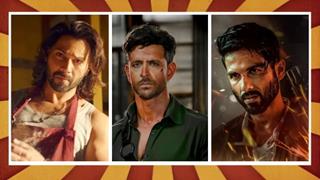Directed Taylor Hackford.
You've seen Ben Kingsley play Gandhi, Denzel Washington play Malcolm X and Robert Downey Jr. play Charlie Chaplin. Lately you've seen Leonardo DiCaprio slip into the role of Howard Hughes in "The Aviator".
But nothing prepares you for the amazing virtuosity of Jamie Foxx, who starred as the harassed cabbie in "Collateral", playing jazz and R&B musician Ray Charles in this handsomely crafted, emotionally plush bio-pic.
If, in "Collateral", Foxx grapples with an assassin's eccentric demands, in "Ray" he has far more internalised problems to deal with.
To portray a super-successful blind musician, who suffered severe spells of challenged self-worth even as he re-wrote all the rules of popular music in the 1960s and 1970s, couldn't have been easy.
Foxx rides the biographical notes without jumping the scale.
 Ray Charles' wonky gait and headstrong vision are crystallised in the actor's virtuoso performance. In
truth, the film is peppered with those delectable performances that add great depth to a true-life
character's ambience. Every member of the cast knows his Ray Charles, that's for sure.
Ray Charles' wonky gait and headstrong vision are crystallised in the actor's virtuoso performance. In
truth, the film is peppered with those delectable performances that add great depth to a true-life
character's ambience. Every member of the cast knows his Ray Charles, that's for sure.Given director Taylor Hackford's unalloyed treatment of a life that needs constant celebration, Ray Charles' life and music come alive in ways that challenge audiences' perceptions of cinematic entertainment.
At the same time, the man and his music scatter their web in a plot that stretches effortlessly through two decades of tumultuous socio-political and musical history.
The most magical part of this musical marathon is its ability to mesh the protagonist's inner and outer lives.
While we watch the birth, corruption and final redemption of a musical phenomenon, we are also taken back by Hackford to the musical prodigy's past. In fact, some of the film's most enchanting passages occur in Ray's childhood where we meet his brave, spirited mother (Sharon Warren) eking out a living.
 Scenes showing the mother rising above personal tragedy (the death of Ray's baby brother, which haunts
him throughout his life) are given a subtle surrealistic touch. They are vividly entwined into Ray's
drug-induced hallucinations.
Scenes showing the mother rising above personal tragedy (the death of Ray's baby brother, which haunts
him throughout his life) are given a subtle surrealistic touch. They are vividly entwined into Ray's
drug-induced hallucinations.Indeed Ray Charles' tryst with heroin runs like a shot in the vein in the narrative.
Hackford is a stranger neither to the musical biopic (he has done a bio-pic on Chuck Berry) nor the trauma of familial bonding ("Dolores Clairborne").
His exploration of the mind, heart and libido of a musical genius is made special by the very careful attention paid to the texture colour and flavour of sounds smells and sighs that define the various stages in Ray Charles' growth as a man and a musician.
There are several lucid passages delineating the protagonist's slump into self-absorbed and demented womanising.
Ray's troubled relationship with his patient and faithful wife Della (Kerry Washington) gives to the film its startling lifelike architecture and texture-qualities that can be easily overlooked in the face of Foxx's fabulous performance.
To designate "Ray" a triumph of the performing spirit would be apt, and yet the film's fringe benefits are also immense.
 Eras and musical fads roll by effortlessly as Ray Charles grows into a roaring musical experience. The
actual musician's songs are used with an understated forcefulness. While we hear the songs being played
we also feel the music of the protagonist's life beckoning us into a circle of frenzied, often self-destructive,
rhythms.
Eras and musical fads roll by effortlessly as Ray Charles grows into a roaring musical experience. The
actual musician's songs are used with an understated forcefulness. While we hear the songs being played
we also feel the music of the protagonist's life beckoning us into a circle of frenzied, often self-destructive,
rhythms.What remains with us is the struggle of a physically handicapped genius to go beyond fate. Obstructed by the colour of his skin and visual impairment, Ray Charles shot to fame breaking many rules, hearts and moral codes along the way. All of these are vividly mapped in this incredible biopic.
Oscar for Jamie Foxx? It was the least they could do.














